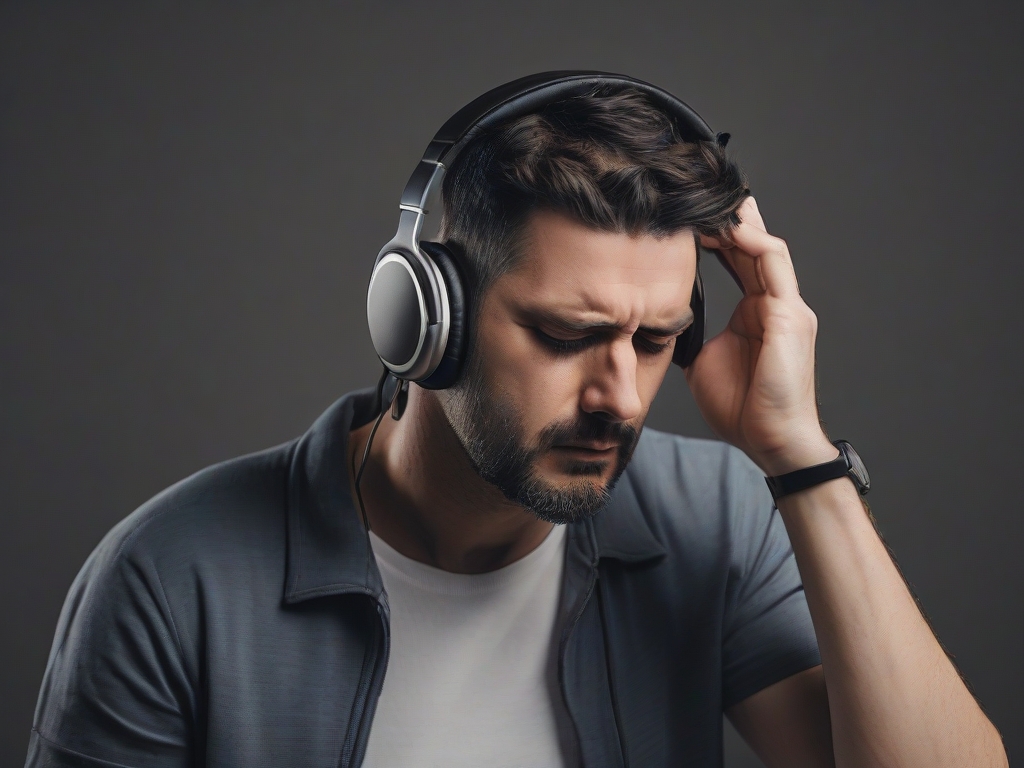
(NB Links may be affiliate links. See my disclosure here)
Can Binaural beats damage your brain? Have you ever wondered if using binaural beats can actually be damaging to your brain? It’s a question that many people have asked, and today we’re going to dive into the topic and explore the potential dangers. But don’t worry, we’ll also discuss whether or not binaural beats are safe to use, so you can make an informed decision.
Disclaimer: I am not medically trained and this article is not medical advice. It is purely based on my research and personal experience and my experiences listening have always been positive. If you plan to try out brainwave entrainment or binaural beats, be sure to carry out your own research, make your own decision and follow any guidelines or warnings by the producer very carefully.
- Binaural Beats Rise in Popularity
- Introduction to Binaural Beats
- What are binaural beats?
- How do binaural beats work?
- The Effects of Binaural Beats
- Understanding Brainwaves
- Can Binaural Beats Cause Damage?
- Scientific Perspective on Binaural Beats
- Safety Guidelines for Using Binaural Beats
- Benefits of Binaural Beats
- How to Use Binaural Beats Safely
- Alternative Methods for Brain Stimulation
- Can Binaural Beats Damage Your Brain Conclusion
Binaural Beats Rise in Popularity
Binaural beats have gained popularity in recent years for their supposed ability to enhance relaxation, focus, and even sleep. These beats work by playing two slightly different frequencies in each ear, which then create a third frequency in the brain.
However, some individuals have expressed concerns about the potential negative effects on their brain health. In the upcoming article, we’ll delve into the possible dangers of using binaural beats and uncover whether these concerns hold any merit. Rest assured, we’ll also explore why binaural beats are generally regarded as safe, so you can continue using them without worry. Don’t miss out, keep reading to find out more!
Can Binaural Beats Damage Your Brain?
Introduction to Binaural Beats
Binaural beats are a form of auditory stimulation that has gained popularity in recent years for its potential benefits on brain health. They are created by playing two slightly different frequencies in each ear, which then merge in the brain, producing a third frequency known as the binaural beat. These beats are believed to influence brainwave patterns, leading to various mental and emotional effects.
What are binaural beats?
Binaural beats are a type of soundwave therapy that aims to synchronize brainwaves to a desired frequency. By using headphones, each ear receives a slightly different frequency, and the brain perceives the difference between the two as a rhythmic pulsing sound. This perceived sound is what creates the binaural beat.
How do binaural beats work?
When we hear a sound, our brain processes it and produces electrical activity known as brainwaves. Different brainwave frequencies are associated with different states of consciousness, such as relaxation, focus, or sleep. Binaural beats work by entraining the brain to match the frequency of the binaural beat, altering the brainwave activity and inducing a desired mental state.
Read a more detailed explanation here.
The Effects of Binaural Beats
Positive effects of binaural beats
Research suggests that binaural beats can have positive effects on various aspects of mental well-being. They have been found to reduce anxiety, stress, and improve mood. Additionally, binaural beats may enhance cognitive function by improving focus, concentration, and memory. Some individuals also report experiencing increased creativity and a sense of relaxation through the use of binaural beats.
Negative effects of binaural beats
While binaural beats are generally considered safe, there are some potential dangers and negative effects associated with their use. Some individuals may experience headaches or dizziness when listening to binaural beats, especially at high volumes or frequencies. It is also important to note that binaural beats should not be used by individuals with epilepsy or those prone to seizures, as they may potentially trigger a seizure.
Understanding Brainwaves
To better understand the effects of binaural beats, it is important to have a basic understanding of the different types of brainwaves.
Alpha brainwaves
Alpha brainwaves are associated with a relaxed and meditative state. They are often present when we are in a calm and peaceful mental state, such as during meditation or right before falling asleep.
Beta brainwaves
Beta brainwaves are associated with alertness, focus, and active mental states. They are present when we are engaged in thinking, problem-solving, or any task that requires concentration.
Theta brainwaves
Theta brainwaves are associated with deep relaxation, creativity, and dreaming states. They are often present during meditation, deep relaxation, and daydreaming.
Delta brainwaves
Delta brainwaves are the slowest brainwave frequency and are associated with deep sleep and unconsciousness. They are essential for restorative sleep and the rejuvenation of the mind and body.
Gamma brainwaves
Gamma brainwaves are the fastest brainwave frequency and are associated with heightened mental activity. They are often present during periods of intense focus, concentration, and peak performance.
Can Binaural Beats Cause Damage?
Controversies over binaural beats
There is ongoing debate and controversy surrounding the use of binaural beats and their potential risks. Some argue that the effects of binaural beats are purely placebo, suggesting that any reported benefits are simply the result of suggestion and the power of the mind. Others believe that binaural beats can have genuine effects on brainwave activity and mental states.
Potential risks of using binaural beats
While binaural beats are generally considered safe, there are some potential risks and considerations to keep in mind. As mentioned earlier, individuals with epilepsy or a history of seizures should avoid using binaural beats, as they may potentially trigger a seizure. Additionally, listening to binaural beats at high volumes or for extended periods can cause discomfort, headaches, or dizziness in some individuals. It is essential to use binaural beats cautiously and discontinue use if any negative effects occur.
Scientific Perspective on Binaural Beats
Studies on binaural beats and brain health
Numerous studies have been conducted to explore the effects of binaural beats on brain health and mental well-being. While the research is still in its early stages, several studies have shown promising results. For example, a study published in the Journal of Alternative and Complementary Medicine found that binaural beats could significantly reduce anxiety levels and improve mood in participants.
Research findings and conclusions
While more research is needed to fully understand the effects of binaural beats, current findings suggest that they can indeed influence brainwave activity and have positive effects on mental states. However, it is important to note that individual experiences may vary, and more research is needed to determine the specific mechanisms and long-term effects of binaural beats.
Safety Guidelines for Using Binaural Beats
Choosing reliable sources
When using binaural beats, it is crucial to choose reliable sources that provide high-quality recordings. Make sure to select reputable sources that offer scientifically researched and tested recordings to ensure the effectiveness and safety of the binaural beats. My favourites:
Listening duration and volume levels
It is recommended to start with shorter listening sessions of around 15-30 minutes and gradually increase the duration if desired. Additionally, it is important to keep the volume at a comfortable level and avoid listening to binaural beats at excessively high volumes, as this can cause discomfort and potential side effects.
Potential contraindications
As mentioned earlier, individuals with epilepsy or a history of seizures should avoid using binaural beats. Additionally, those with certain medical conditions or who are on specific medications should consult their healthcare provider before using binaural beats, as they may have contraindications or unwanted interactions.
Benefits of Binaural Beats
Stress reduction
One of the primary benefits of binaural beats is their potential to reduce stress and induce a state of relaxation. The synchronization of brainwaves to a desired frequency can help calm the mind and promote a sense of calm and tranquility.
Improved focus and concentration
Binaural beats have been shown to enhance focus and concentration, making them beneficial for studying, working, or engaging in tasks that require sustained attention. The entrainment of brainwaves to a specific frequency can help improve cognitive function and increase mental clarity.
Enhanced creativity
Many individuals report an increase in creativity while listening to binaural beats. The altered brainwave activity induced by binaural beats can stimulate the creative centers of the brain, leading to enhanced ideation and imaginative thinking.
Better sleep quality
Binaural beats, particularly those in the delta frequency range, can be beneficial for improving sleep quality and promoting a deeper, more restful slumber. Listening to binaural beats before bed can help relax the mind and prepare the body for sleep.
How to Use Binaural Beats Safely
Finding the right frequency
Experiment with different frequencies to find the one that works best for your desired mental state. Different frequencies are associated with different effects, so it is important to find the appropriate frequency that resonates with your goals.
Creating a suitable listening environment
Ensure that you have a comfortable, quiet space where you can relax and focus on the binaural beats without distractions. Using high-quality headphones can also enhance the effectiveness of the binaural beats.
Incorporating binaural beats into your routine
To maximize the benefits of binaural beats, consider incorporating them into your daily routine. Set aside time each day to listen to binaural beats and make it a regular practice. Consistency is key to experiencing the desired effects.
Alternative Methods for Brain Stimulation
While binaural beats can be a valuable tool for brain stimulation, there are also alternative methods that can be explored for similar benefits.
Other forms of sound therapy
Sound therapy, such as isochronic tones or white noise, can provide similar effects to binaural beats. Experimenting with different sound therapies can help find the one that resonates best with your goals and preferences.
Meditation and mindfulness practices
Engaging in meditation and mindfulness practices can also have profound effects on brain health and mental well-being. Mindfulness meditation, in particular, has been extensively studied and shown to reduce stress, improve focus, and enhance overall mental well-being.
Natural remedies and supplements
In addition to sound therapy and meditation, certain natural remedies and supplements, such as herbal teas, essential oils, and adaptogenic herbs, can support brain health and provide calming effects. It is essential to consult with a healthcare professional before incorporating any new supplements or remedies into your routine.
Can Binaural Beats Damage Your Brain Conclusion
When considering the risks and benefits of binaural beats, it is evident that they can have positive effects on mental well-being when used safely and responsibly.
While there are potential risks and individual variations to keep in mind, binaural beats can be a valuable tool for stress reduction, improved focus, enhanced creativity, and better sleep quality. As research progresses, our understanding of binaural beats and their impacts on brain health will continue to evolve.
It is important to approach their use with caution, use reliable sources, and adhere to safety guidelines to reap the potential benefits without compromising your brain health.






